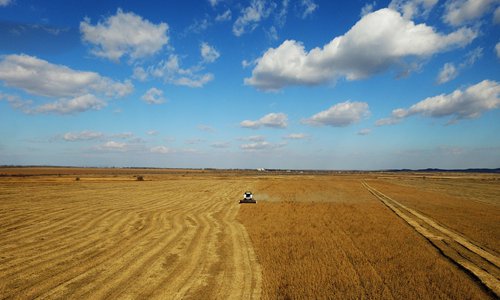HOME >> BUSINESS
Soymeal from Argentina can help ensure livestock feed supply: experts
Source:Global Times Published: 2019/9/11 22:38:40

A combine harvester collects soybeans in the village of Khorol, Russia File photo: VCG
Bai Ming, deputy director of the International Market Research Institute of the Chinese Ministry of Commerce, told the Global Times on Wednesday that allowing imports from Argentina is an important step to ensure diverse sources of farm products, especially under the impact of the trade war with the US.
"China has been importing soybeans and processing them into soymeal," Bai said. "Now that the original industrial chain has been disrupted by the US-provoked trade war, multiplying channels for importing farm products is an important strategy to ensure the supply of livestock feed, especially for the live pig market."
China relies heavily on soybean imports for the production of livestock feed, according to Bai, and the decrease in imports of soybeans means China is opting to import processed soymeal to ensure its supply.
China imported 95.5 million tons of soybeans in 2017, constituting 87 percent of the total soybean supply, and around 34 percent of the total imports were from the US.
Since the trade war, however, soybean imports have been plunging. In 2018, China's total amount of imported soybeans dropped 7.9 percent to 88 million tons. The amount from the US plummeted 49.4 percent to 16.6 million tons.
Argentina has been trying to export soymeal to China for many years, and it is the biggest exporter of soymeal in the world, Reuters reported. The country is expected to export a total of 26 million tons of soymeal and 8.5 million tons of soybeans in 2019, the report said. China has been the biggest consumer of soymeal globally due to the huge demand in its live pig industry.
China's live pig industry has been hit by the African swine fever outbreak, and demand for livestock feed such as soymeal might remain smaller than usual in the short term, Bai said. According to statistics from the Ministry of Agriculture, live pig stocks in July decreased 9.4 percent compared to June, and were down 32.2 percent year-on-year.
Apart from Argentina, China has been increasing imports of soybeans and soymeal from other channels. China imported 817,000 tons of soybeans from Russia in 2018, up 64.7 percent year-on-year, according to the Ministry of Commerce. On Friday China allowed imports of soymeal, as well as rapeseed meal and sunflower meal from Russia.